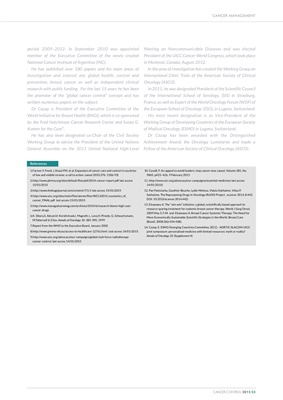
Meeting on Noncommunicable Diseases and was elected
President of the UICC Cancer World Congress, which took place
in Montreal, Canada, August 2012.
In the area of investigation has created the Working Group on
International Clinic Trials of the American Society of Clinical
Oncology (ASCO).
In 2011, he was designated President of the Scientific Council
of the International School of Senology, (SIS) in Strasburg,
France, as well as Expert of the World Oncology Forum (WOF) of
the European School of Oncology (ESO), in Lugano, Switzerland.
His most recent designation is as Vice-President of the
Working Group of Developing Countries of the European Society
of Medical Oncology (ESMO) in Lugano, Switzerland.
Dr Cazap has been awarded with the Distinguished
Achievement Award; the Oncology Luminaries and made a
Fellow of the American Society of Clinical Oncology (ASCO).
CANCER MANAGEMENT
CANCER CONTROL 2015 53
period 2009-2012. In September 2010 was appointed
member of the Executive Committee of the newly created
National Cancer Institute of Argentina (INC).
He has published over 180 papers and his main areas of
investigation and interest are: global health, control and
prevention, breast cancer as well as independent clinical
research with public funding. For the last 15 years he has been
the promoter of the "global cancer control" concept and has
written numerous papers on the subject.
Dr Cazap is President of the Executive Committee of the
World Initiative for Breast Health (BHGI), which is co-sponsored
by the Fred Hutchinson Cancer Research Center and Susan G.
Komen for the Cure®.
He has also been designated co-Chair of the Civil Society
Working Group to advise the President of the United Nations
General Assembly on the 2011 United National High-Level
References
1.farmer F, Frenk J, Knaul FM, et al. Expansion of cancer care and control in countries
of low and middle income: a call to action. Lancet 2010;376 :1186-93)
2.http://www.phrma.org/sites/default/files/pdf/2014-cancer-report.pdf last access
15/01/2015
3.http://www.thehugojournal.com/content/7/1/1 last access 15/01/2015
4.http://www.uicc.org/sites/main/files/atoms/files/wcls2014_economics_of_
cancer_final.pdf last access 15/01/2015
5.http://www.managedcaremag.com/archives/2014/6/research-blame-high-costcancer-drugs
6.K. Sikora,S. Advani,V. Koroltchouk,I. Magrath, L. Levy,H. Pinedo, G. Schwartsmann,
m.tattersall & s.yan. Annals of Oncology 10: 385-390, 1999
7.report from the WHO to the Executive Board, January 2002
8.http://www.greens-efa.eu/access-to-healthcare-12761.html ; last access 14/01/2015
9.http://www.uicc.org/advocacy/our-campaigns/global-task-force-radiotherapycancer-control;
last access 14/01/2015
10. Cavalli, F. An appeal to world leaders: stop cancer now. Lancet, Volume 381, No.
9865, p425-426, 9 February 2013
11. http://www.uicc.org/advocacy/our-campaigns/essential-medicines last access
14/01/2015)
12. Pan Pantziarka, Gauthier Bouche, Lydie Meheus, Vidula Sukhatme, Vikas P.
Sukhatme. The Repurposing Drugs in Oncology (ReDO) Project . ecancer 2014, 8:442
DOI: 10.3332/ecancer.2014.442)
13. Elzawawy A. The "win-win" initiative: a global, scientifically based approach to
resource sparing treatment for systemic breast cancer therapy. World J Surg Oncol.
2009 May 5;7:44 and Elzawawy A. Breast Cancer Systemic Therapy: The Need for
More Economically Sustainable Scientific Strategies in the World. Breast Care
(Basel). 2008;3(6):434-438).
14. Cazap, E. ESMO Emerging Countries Committee, (ECC) - AORTIC-SLACOM-UICC
joint symposium: personalised medicine with limited resources: myth or reality?
Annals of Oncology 25 (Supplement 4)